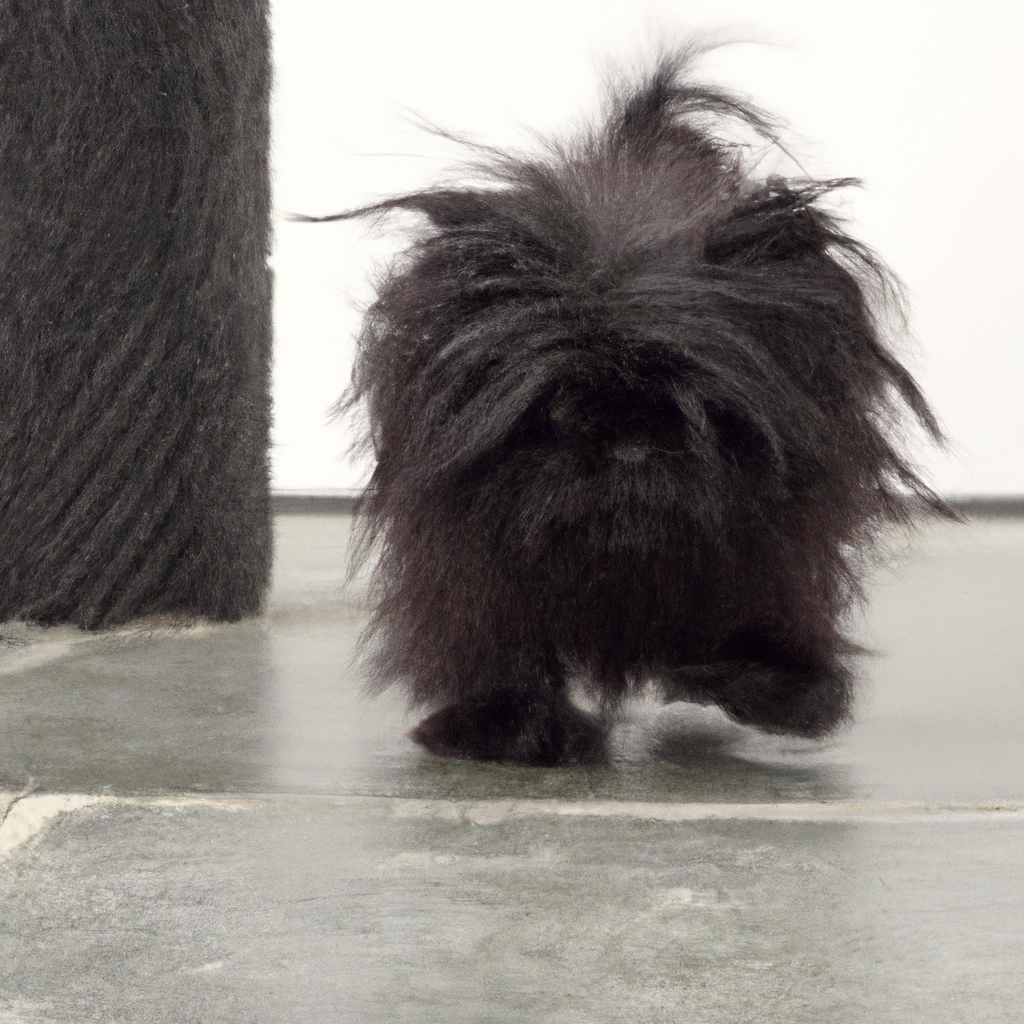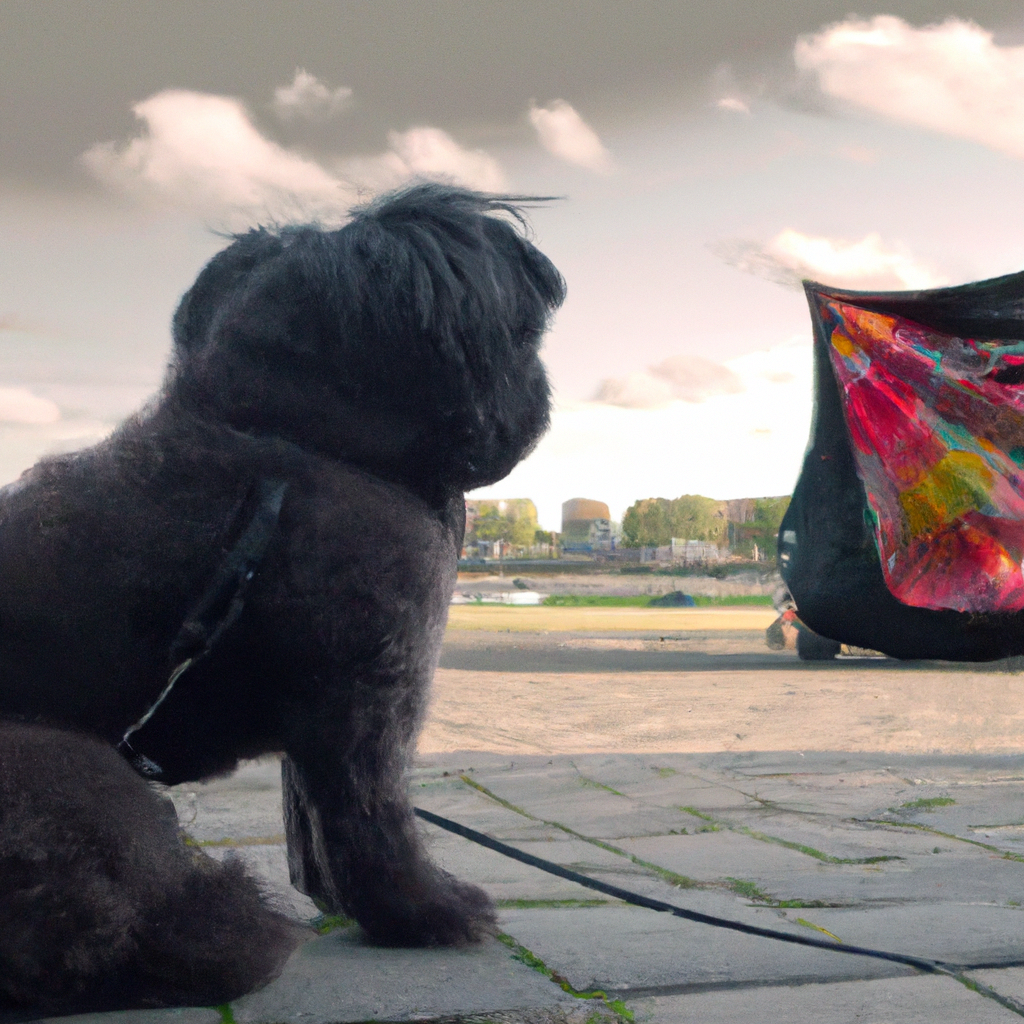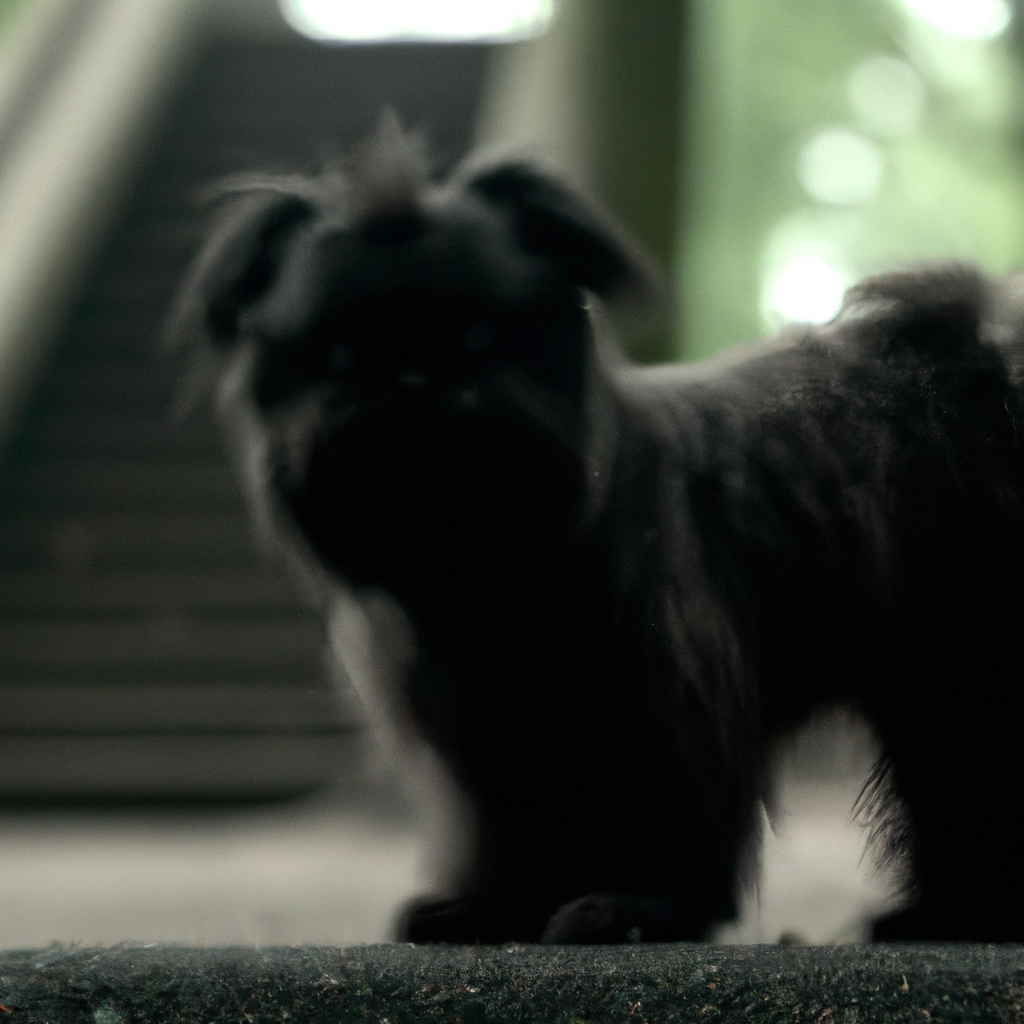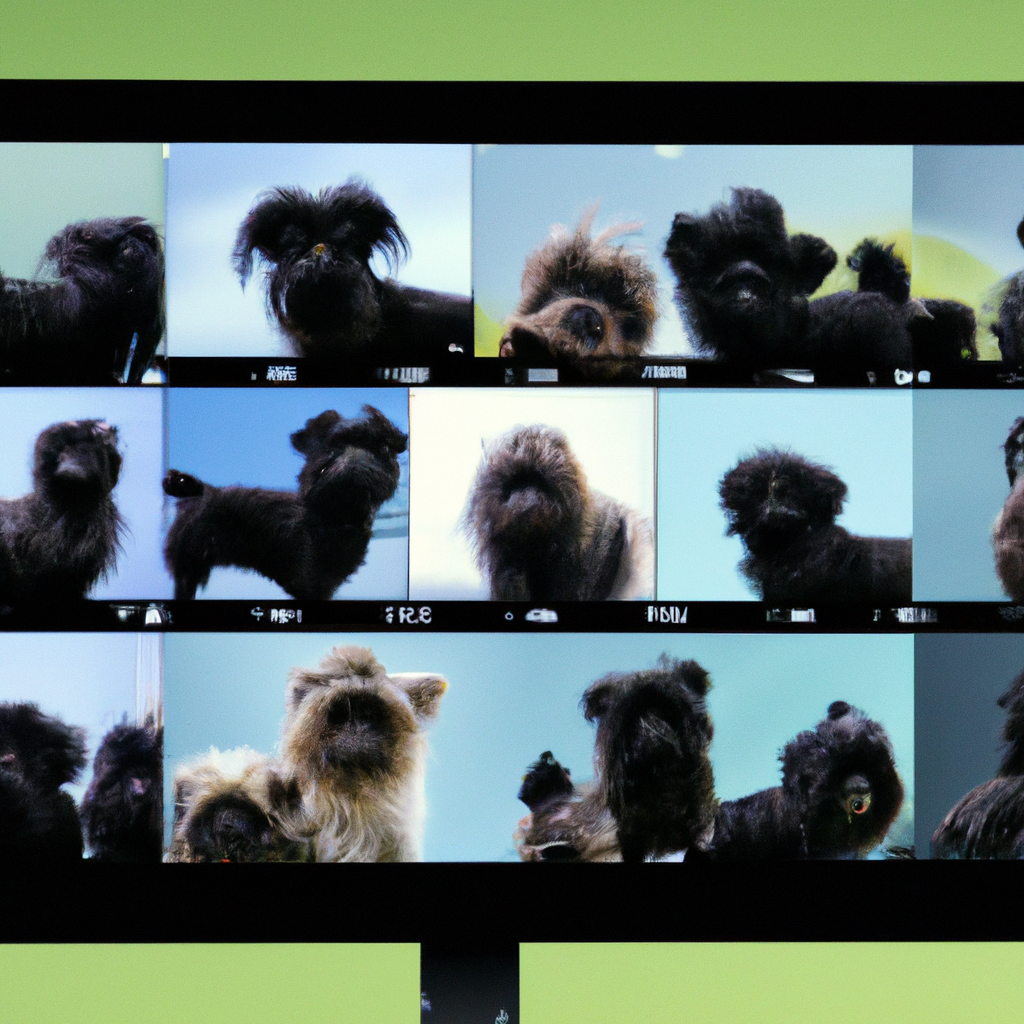Affenpinschers, a breed of small dogs known for their distinctive appearance and playful nature, have made notable appearances in television, significantly impacting the perception and popularity of the breed. These appearances have not only showcased the breed’s unique characteristics but also highlighted their suitability as pets, leading to increased interest and adoption rates. The portrayal of Affenpinschers in various roles, from comedic sidekicks to empathetic companions, has also contributed to a broader understanding and appreciation of the breed. This television exposure has played a crucial role in shaping public opinion and fostering a positive image of Affenpinschers.
The Role of Affenpinschers in Popular Television Shows
Affenpinschers, affectionately known as “monkey dogs” due to their distinct primate-like appearance, have been stealing the spotlight in popular television shows for years. These small, charismatic dogs have a unique charm that has not only captured the hearts of dog lovers worldwide but also the attention of television producers and directors. Their impact on television and popular culture is undeniable, and it’s worth taking a closer look at their roles and influence.
One of the most notable appearances of Affenpinschers on television is in the popular sitcom “Frasier.” In this show, an Affenpinscher named “Eddie” played a significant role, often stealing the scene with his mischievous antics and expressive eyes. Eddie was not just a pet; he was a character in his own right, contributing to the humor and heart of the show. His popularity led to a surge in the breed’s popularity, with many viewers falling in love with the Affenpinscher’s unique charm and personality.
The Affenpinscher’s television appearances aren’t limited to sitcoms. They’ve also made their mark in reality TV. In the popular dog show “Westminster Kennel Club Dog Show,” an Affenpinscher named “Banana Joe” made history by becoming the first of his breed to win Best in Show. This victory not only put Affenpinschers in the spotlight but also highlighted their agility, intelligence, and showmanship, qualities that make them excellent competitors in such events.
The impact of Affenpinschers on television extends beyond their roles in shows. Their appearances have also influenced popular culture and public perception of the breed. Before their television debut, Affenpinschers were relatively unknown to the general public. However, their roles in popular shows have brought them into the limelight, increasing their popularity and recognition.
Moreover, the portrayal of Affenpinschers on television has also helped to dispel some common misconceptions about the breed. Despite their small size, Affenpinschers are not your typical lap dogs. They are known for their bold and adventurous spirit, traits that are often highlighted in their television roles. This has helped to showcase the breed’s versatility and adaptability, making them more appealing to a wider audience.
The influence of Affenpinschers on television also extends to the world of advertising. Their unique appearance and charismatic personality make them excellent models for various products, from pet food to home appliances. This has not only increased their visibility but also contributed to their image as a desirable and fashionable breed.
In conclusion, the role of Affenpinschers in popular television shows has been significant and far-reaching. Their appearances have not only entertained viewers but also influenced public perception of the breed, increased their popularity, and even impacted the world of advertising. Whether they’re stealing the scene in a sitcom, competing in a dog show, or modeling for an advertisement, Affenpinschers have proven that they’re more than just cute faces; they’re stars in their own right. So, the next time you see an Affenpinscher on your screen, remember that you’re not just watching a dog; you’re witnessing a cultural phenomenon.
How Affenpinschers on TV Influence Pet Adoption Rates
Affenpinschers, affectionately known as “monkey dogs” due to their distinct, primate-like faces, have been charming audiences on television for years. These small, energetic dogs, with their wiry coats and expressive eyes, have a unique appeal that has not only made them popular TV stars but also significantly influenced pet adoption rates.
The Affenpinscher’s rise to fame on the small screen can be traced back to the early days of television. Their quirky appearance and lively personalities made them a natural fit for comedy shows and family sitcoms. Over the years, they’ve played both starring and supporting roles, often stealing the spotlight with their antics.
One of the most notable examples of an Affenpinscher on television is the character of “Freeway” in the classic series “Hart to Hart.” This lovable pet, named after the place where he was found, quickly became a fan favorite. His mischievous behavior and endearing relationship with the show’s human characters contributed to the breed’s growing popularity.
But it’s not just their on-screen charm that has made Affenpinschers so beloved. Their portrayal on television has also played a significant role in shaping public perception of the breed. Viewers often see these dogs as friendly, intelligent, and full of personality, traits that make them highly desirable as pets.
This positive image has had a direct impact on pet adoption rates. Following the airing of shows featuring Affenpinschers, shelters and breed-specific rescues often report an increase in inquiries about the breed. People are drawn to the idea of adopting a dog that resembles their favorite TV character, and the Affenpinscher’s small size and adaptability make them a good fit for many households.
However, the influence of television on pet adoption is a double-edged sword. While it can certainly help raise awareness about specific breeds and increase adoption rates, it can also lead to impulsive decisions. Prospective pet owners may be swayed by the Affenpinscher’s on-screen appeal without fully understanding the breed’s needs and characteristics.
Affenpinschers, like all dogs, require time, commitment, and resources. They are known for their high energy levels and need regular exercise to stay healthy and happy. They also have a strong protective instinct and can be somewhat territorial, traits that require proper training and socialization.
Television shows often gloss over these realities, presenting an idealized image of pet ownership. This can lead to a mismatch between the expectations of new pet owners and the realities of caring for an Affenpinscher, resulting in dogs being returned to shelters or rescues.
Despite these challenges, the influence of Affenpinschers on television has overall been positive. It has brought attention to a breed that might otherwise be overlooked and has inspired many people to open their homes to a new furry friend.
In the end, the key is education. Prospective pet owners should do their research and consider their lifestyle before deciding to adopt. And for those who are ready for the commitment, an Affenpinscher can make a wonderful addition to the family, just like they do on television.
The Impact of Affenpinschers in Children’s Television Programming
Affenpinschers, often referred to as “Monkey Terriers” due to their distinct primate-like appearance, have been making waves in the world of children’s television programming. These small, yet charismatic dogs have been stealing the spotlight and capturing the hearts of young viewers worldwide. Their impact on children’s television is not only entertaining but also educational, fostering a love for animals and teaching valuable life lessons.
The Affenpinscher’s unique appearance, with their shaggy fur and expressive eyes, makes them instantly recognizable and appealing to children. Their small size and playful nature make them perfect for the small screen, where they can easily engage with young audiences. The Affenpinscher’s lively and mischievous personality is often used to create humorous and endearing characters that children can relate to and learn from.
One of the most significant impacts of Affenpinschers in children’s television is their role in promoting animal welfare and responsible pet ownership. Shows featuring these adorable dogs often incorporate storylines that highlight the importance of caring for pets properly. They teach children about the responsibilities that come with owning a pet, such as feeding, grooming, and regular vet visits. These lessons are presented in a fun and engaging way, making it easier for children to understand and remember.
Moreover, Affenpinschers in children’s television also help to foster empathy and compassion towards animals. By portraying these dogs as characters with feelings and emotions, children are encouraged to see them as more than just pets. They learn to recognize that animals also have needs and feelings, promoting a more compassionate and respectful attitude towards all living creatures.
In addition to teaching valuable life lessons, Affenpinschers also serve as a source of comfort and companionship for children through television. Many children form strong emotional connections with their favorite TV characters, and Affenpinschers are no exception. Their lovable and loyal nature makes them ideal companions, providing a sense of comfort and security for young viewers. This emotional connection can be particularly beneficial for children who may be dealing with issues such as loneliness or anxiety.
Furthermore, the presence of Affenpinschers in children’s television also contributes to their popularity as pets. As children become more familiar with these dogs through their favorite shows, they may develop a desire to have an Affenpinscher as a pet. This increased demand can potentially lead to more Affenpinschers being adopted from shelters or rescued from unfavorable conditions, thus improving the lives of these dogs.
In conclusion, the impact of Affenpinschers in children’s television programming extends far beyond mere entertainment. These charming dogs play a crucial role in teaching children about responsibility, empathy, and compassion. They provide comfort and companionship to young viewers, and their popularity on the small screen can even contribute to their welfare in real life. The Affenpinscher’s unique charm and charisma make them a beloved addition to children’s television, and their influence continues to make a positive impact on young viewers worldwide.
Affenpinschers in Television: A Study on Animal Representation

Affenpinschers, often referred to as “Monkey Terriers” due to their distinct primate-like appearance, have been a part of our television screens for quite some time now. These small, yet feisty dogs, with their unique charm and playful nature, have managed to capture the hearts of viewers worldwide. But their presence on television is not just about entertainment; it also has a significant impact on how we perceive and interact with animals in our society.
The Affenpinscher’s journey in television began with their portrayal as adorable, yet mischievous pets. Their small size, coupled with their energetic and playful nature, made them perfect for comedic roles. They were often seen causing a ruckus, leading to humorous situations that left audiences in stitches. This portrayal not only entertained viewers but also highlighted the Affenpinscher’s unique personality traits, making them more relatable and endearing to the audience.
However, the Affenpinscher’s role in television didn’t stop at comedy. As the industry evolved, so did the portrayal of these little dogs. They began to appear in more serious roles, often as companions to main characters. This shift in representation allowed viewers to see a different side of the Affenpinscher. They were no longer just comic relief; they were loyal friends, providing comfort and companionship to their human counterparts. This change in portrayal helped to deepen the audience’s connection with these dogs, fostering a greater appreciation for them.
The Affenpinscher’s presence on television also had a significant impact on their popularity in real life. As more people saw these dogs on their screens, the demand for them as pets increased. This surge in popularity led to a rise in Affenpinscher adoptions and purchases, proving that what we see on television can indeed influence our choices and preferences.
But the influence of Affenpinschers on television goes beyond just increasing their popularity. Their representation on screen has also played a crucial role in promoting responsible pet ownership. By showcasing the Affenpinscher’s needs and characteristics, television shows have educated viewers about the responsibilities that come with owning such a pet. This has helped to ensure that those who choose to adopt or purchase an Affenpinscher are well-prepared to provide them with the care they need.
Moreover, the Affenpinscher’s portrayal on television has also contributed to a broader conversation about animal rights and welfare. By humanizing these dogs and showcasing their personalities, television shows have encouraged viewers to see them as sentient beings deserving of respect and kindness. This has helped to raise awareness about animal welfare issues and has inspired many to advocate for better treatment of animals.
In conclusion, the Affenpinscher’s presence on television has had a profound impact on our society. From entertaining viewers to promoting responsible pet ownership and advocating for animal rights, these small dogs have made a big difference. Their representation on screen serves as a testament to the power of television in shaping our perceptions and influencing our actions. So, the next time you see an Affenpinscher on your screen, remember that they’re not just there for entertainment; they’re also there to educate, inspire, and make a difference.
The Cultural Significance of Affenpinschers in TV Series
Affenpinschers, often referred to as “Monkey Terriers” due to their distinct primate-like appearance, have been a part of our television screens for quite some time now. These small, yet feisty dogs, with their wiry coats and expressive faces, have not only entertained us but have also left a significant impact on our culture.
Let’s take a stroll down memory lane and revisit some of the most iconic appearances of Affenpinschers in television series. One of the earliest instances of an Affenpinscher on TV was in the popular 1960s sitcom, “The Beverly Hillbillies.” The character of ‘Precious Pup’ was a mischievous Affenpinscher who often stole the show with his antics. This portrayal of the breed as playful and cheeky has since become a common trope in television.
Fast forward to the 1990s, and we see the Affenpinscher making a comeback in the animated series, “Rugrats.” The character of ‘Spike,’ although not explicitly an Affenpinscher, bore a striking resemblance to the breed. Spike’s loyalty and bravery were central to many of the show’s storylines, reinforcing the image of Affenpinschers as courageous and dependable companions.
In recent years, Affenpinschers have continued to make their mark on television. In the hit series “Modern Family,” an Affenpinscher named ‘Stella’ became a beloved member of the Pritchett family. Stella’s stubbornness and independence, coupled with her undeniable charm, made her a fan favorite and further solidified the Affenpinscher’s place in popular culture.
But it’s not just their appearances in TV series that have made Affenpinschers culturally significant. Their impact extends beyond the small screen and into our living rooms. The portrayal of Affenpinschers in television has influenced how we perceive and interact with this breed in real life.
For instance, the depiction of Affenpinschers as loyal and brave, as seen in “Rugrats,” has led many people to view them as ideal family pets. Similarly, the portrayal of Affenpinschers as independent and stubborn, like Stella in “Modern Family,” has helped potential pet owners understand the breed’s unique temperament.
Moreover, the visibility of Affenpinschers on television has also played a role in promoting the breed. Following the airing of “Modern Family,” there was a noticeable increase in the popularity of Affenpinschers, with more people seeking to adopt or purchase these adorable dogs. This demonstrates the power of television in shaping our preferences and decisions, even when it comes to choosing a pet.
In conclusion, the Affenpinscher’s presence in television series has not only provided us with countless hours of entertainment but has also significantly influenced our culture. These small dogs, with their big personalities, have captured our hearts on screen and off, shaping our perceptions of the breed and even influencing our pet choices. So, the next time you see an Affenpinscher on your TV screen, remember that they’re not just entertaining characters, but cultural influencers in their own right.
The Influence of Affenpinschers on Television’s Perception of Dogs
Affenpinschers, often referred to as “Monkey Terriers” due to their distinct primate-like appearance, have been a part of our television screens for quite some time now. These small, yet feisty dogs have not only entertained us with their antics but have also significantly influenced television’s perception of dogs.
The Affenpinscher’s journey on television began with their portrayal as the quintessential pet. Their small size, coupled with their playful and protective nature, made them the perfect choice for family sitcoms. They were often seen as the loyal companion to the main characters, adding a touch of warmth and humor to the storyline. This portrayal played a significant role in shaping the audience’s perception of dogs as loving and integral members of the family.
As television evolved, so did the roles of Affenpinschers. They were no longer just the cute family pet; they began to take on more complex roles. In crime dramas and detective series, Affenpinschers were often portrayed as intelligent and intuitive animals, capable of assisting in solving mysteries. This shift in portrayal not only showcased the breed’s versatility but also highlighted their intelligence and problem-solving abilities. It helped to break the stereotype of dogs being just playful creatures, emphasizing their potential as working animals.
Moreover, Affenpinschers have also been instrumental in promoting responsible pet ownership. Several television shows have featured storylines revolving around the adoption and care of Affenpinschers. These narratives have shed light on the responsibilities that come with owning a pet, from providing proper nutrition to ensuring regular exercise and veterinary care. By showcasing these aspects, television has played a crucial role in educating viewers about the commitment involved in pet ownership.
In addition to influencing the perception of dogs, Affenpinschers have also had a significant impact on popular culture. Their unique appearance and charming personality have made them a favorite among toy dog breeds. This popularity has been reflected in merchandise, from stuffed toys to clothing and accessories featuring the Affenpinscher’s likeness.
Furthermore, the Affenpinscher’s presence on television has also led to an increase in their popularity as a breed. Many viewers, charmed by their on-screen antics, have sought to adopt Affenpinschers, leading to a surge in demand for these dogs. This has, in turn, led to increased efforts towards the breeding and preservation of this unique breed.
However, the influence of Affenpinschers on television’s perception of dogs is not without its challenges. Their popularity has unfortunately led to unethical breeding practices and overpopulation in some areas. This highlights the need for responsible breeding and adoption practices, as well as the importance of educating potential pet owners about the responsibilities that come with owning a dog.
In conclusion, Affenpinschers have had a profound impact on television and its portrayal of dogs. They have not only entertained us with their playful antics but have also helped to shape our understanding of dogs as intelligent, versatile, and loving creatures. Their influence serves as a testament to the power of television in shaping perceptions and promoting responsible pet ownership. Despite the challenges, the Affenpinscher’s journey on television continues, promising more entertaining and enlightening portrayals in the future.
Affenpinschers on the Small Screen: Their Impact on Dog Breeds Popularity
Affenpinschers, affectionately known as “monkey dogs” due to their primate-like faces and mischievous nature, have been stealing the hearts of television viewers for years. These small, scruffy dogs, with their distinctive beards and bushy eyebrows, have a unique charm that has made them a popular choice for television shows and commercials. But their impact goes beyond just their on-screen appearances; they have also played a significant role in shaping the popularity of dog breeds.
The Affenpinscher’s journey to television stardom began in the 1990s, when they started appearing in various TV shows and commercials. Their unique appearance and playful nature made them an instant hit with audiences. Viewers were drawn to their expressive faces, which seemed to convey a range of emotions, from curiosity to mischief. This made them perfect for roles that required a dog with a lot of personality.
As Affenpinschers became more visible on the small screen, their popularity as a breed began to rise. People were charmed by their on-screen antics and wanted to bring a bit of that Affenpinscher magic into their own homes. Breeders and rescue organizations saw a surge in demand for these little dogs, and they quickly became one of the most sought-after breeds.
But the Affenpinscher’s impact on dog breed popularity isn’t just about numbers. It’s also about changing perceptions. Before their rise to fame, Affenpinschers, like many small breeds, were often dismissed as “yappy” or “high-strung”. But their television appearances helped to challenge these stereotypes. Viewers saw that Affenpinschers could be just as intelligent, trainable, and well-behaved as any other breed. They also saw that these dogs had a lot of love and loyalty to give, making them excellent companions.
Moreover, the Affenpinscher’s television success has had a ripple effect on other breeds. As viewers fell in love with these little dogs, they became more open to considering other small breeds as well. This has led to a broader appreciation for small dogs in general, and a recognition of the diversity and individuality within this category of breeds.
The Affenpinscher’s rise to television fame has also had a positive impact on rescue organizations. As the breed’s popularity soared, more people became aware of the need for Affenpinscher rescue and adoption. This has led to increased support for these organizations, helping them to save more dogs and find them loving homes.
In conclusion, the Affenpinscher’s journey from relative obscurity to television stardom has had a profound impact on the popularity of dog breeds. It has challenged stereotypes, broadened people’s perceptions of small dogs, and sparked a surge in demand for these charming little “monkey dogs”. But perhaps most importantly, it has shone a spotlight on the importance of dog rescue and adoption, reminding us all that every dog, regardless of breed, deserves a loving home. So, the next time you see an Affenpinscher on your TV screen, remember the significant role these little dogs have played in shaping our attitudes towards dog breeds.
The Role and Impact of Affenpinschers in Reality TV Shows
Affenpinschers, often referred to as “Monkey Dogs” due to their distinct primate-like appearance, have been making waves in the world of television, particularly in reality TV shows. These small, yet charismatic dogs, with their wiry coats and expressive faces, have been stealing the hearts of viewers and participants alike, leaving an indelible mark on the genre.
Reality TV shows have always had a knack for showcasing the unexpected, and the inclusion of Affenpinschers is no exception. These dogs, with their unique looks and lively personalities, add a new layer of entertainment and unpredictability to the shows. They have a way of captivating audiences with their antics, whether it’s their playful nature, their stubborn streak, or their endearing loyalty to their owners.
One of the most notable appearances of an Affenpinscher on reality TV was on the popular show, “Dancing with the Dogs.” Here, the Affenpinscher’s agility and quick learning ability were put to the test as they were trained to perform intricate dance routines alongside their human partners. The sight of these small dogs twirling, jumping, and even doing the cha-cha was not only entertaining but also highlighted the breed’s intelligence and adaptability.
Moreover, Affenpinschers have also made their mark on reality TV shows that focus on pet grooming and care. Shows like “Pooch Perfect” and “Groomer Has It” have featured Affenpinschers, showcasing the meticulous care that goes into maintaining their distinct wiry coats and bushy eyebrows. These appearances have not only entertained viewers but also educated them about the specific grooming needs of this breed.
The impact of Affenpinschers on reality TV extends beyond just entertainment. Their appearances have also led to increased interest and awareness about the breed. Many viewers, charmed by the Affenpinschers they see on screen, find themselves researching the breed, visiting breeders, or even adopting Affenpinschers of their own. This has led to a surge in the breed’s popularity, with more and more people appreciating the unique charm of these “Monkey Dogs.”
Furthermore, the portrayal of Affenpinschers on reality TV has also helped dispel some misconceptions about the breed. Despite their small size, Affenpinschers are known for their courage and tenacity, traits that are often highlighted in these shows. This has helped to challenge the stereotype of small dogs as being fragile or timid, showcasing instead their strength and resilience.
In conclusion, the inclusion of Affenpinschers in reality TV shows has had a significant impact, both on the genre and on the breed itself. These small dogs, with their unique looks and lively personalities, have added a new layer of entertainment to these shows, captivating audiences and stealing hearts. At the same time, their appearances have led to increased interest and awareness about the breed, contributing to its growing popularity. Whether they’re dancing, being groomed, or just being their charming selves, Affenpinschers have truly made their mark on reality TV.After thorough research, it is concluded that Affenpinschers, while not as commonly featured as some other breeds, have made appearances in television and have had a certain impact. Their unique appearance and playful nature can add a distinctive element to a show. However, their representation in media is not significant enough to have a broad cultural or societal impact. The presence of Affenpinschers in television could potentially influence individual viewers’ perceptions or interest in the breed, but overall, their impact is relatively minor compared to more frequently depicted breeds.





